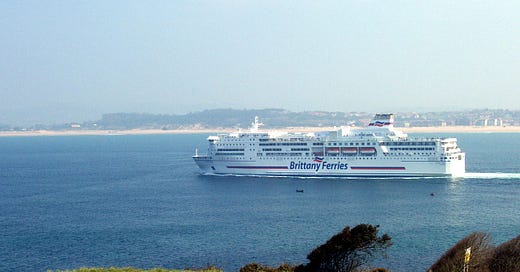Mobility Matters Daily #184 - Ferries and consistent standards
Also, get your Birmingham congestion data with this free tool
Good day my good friend.
Just a couple of things for you today, but they are good I promise! Sadly this is what happens when a poorly dog needs to be taken to the vets again. Regardless, what has been chosen has been chosen especially for you, because I am nice like that.
James
This free daily newsletter is sent to everyone. Paid subscribers get an ad-free version, as well as access to exclusive in-depth analysis once a week, and a tailored analysis on a policy issue once a month. You can upgrade at any time.
Ferries - forgotten by policy makers, but critical
A question: how many ferry trips do you think were made in the UK in 2019? I mean internal ferry trips, not booze cruises across the Channel? According to the Department for Transport, its 42 million, which trips to the Isle of Wight and between the Scottish Islands combined making up about 18.5 million of those. Ok, not exactly huge, but important none-the-less, no? Particularly for the outlying islands they serve.
This article puts the frustration of the industry perfectly. If its not ignored, its treated as if it is deep sea shipping. All the while ignoring its advantages in terms of technological innovation potential, and the fact that they provide critical links whose under-utilisation means that, strangely, a bridge is often seen as more efficient. Any good strategist knows you must understand your strengths and weaknesses. Ferries are not understood at all, `and that is a shame.

Commonality of standards for logistics is a good thing. That doesn’t mean deregulating
In his classic text An Inquiry into the Nature and Causes of the Wealth of Nations, Adam Smith rails against two things. Free market thinkers will only mention one: poor regulation. The second is rent-seeking. For those of you unfamiliar with the term, it essentially means that you try and take a share of the profits without doing anything. Think of a landlord putting the rent up after he sees a business renting out his property is posting record profits.
Regulatory uncertainty and a lack of common standards is both of these. Poor regulation and kept in place because someone makes money from growing trade. Whilst many reports into common standards for logistics on the face of it call for less regulation (see OECD Competition Assessment Reviews). But experience in Europe reveals that common standards are as important as deregulating markets. The Brussels Effect can work both ways (more regulation or less), but regardless for logistics having common standards is a good thing.
Random things
Some random articles that I found whilst sleuthing around the Internet, that may be of interest to you:
Unlocking Transport Connectivity in the Trans-Caspian Corridor (Asian Development Bank)
Peak oil and the low-carbon energy transition: A net-energy perspective (ResearchGate)
Shipping Containers That Spent Weeks Aboard Ships Stuck At Ports Now Being Dumped In Nearby Neighborhoods (CBS Los Angeles)
Does the Gig Economy Mean We're Going to Work Forever? (Vice)
Government altered smart motorway evaluations while MPs waited (Transport Network)
Interesting things

Another cracker today by Visual Capitalist. That’s a lot of iron ore, and many of our vehicles are made of that.
If you do nothing else today, do this
I love this tool by Transport for the West Midlands that allows you to download congestion data for almost any area of the West Midlands. You should check it out.



